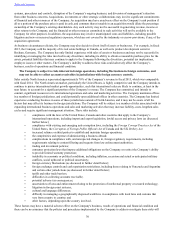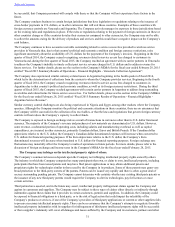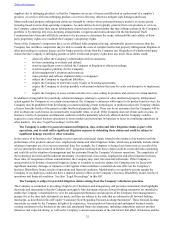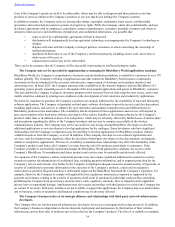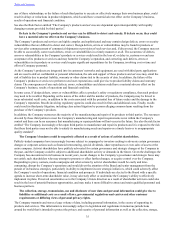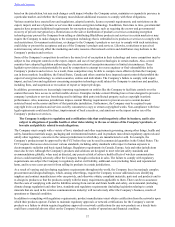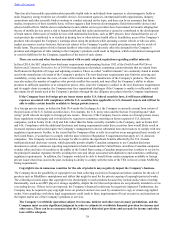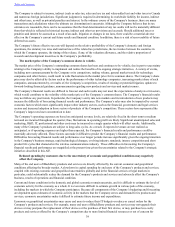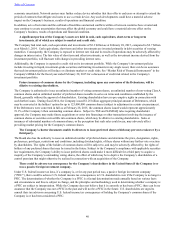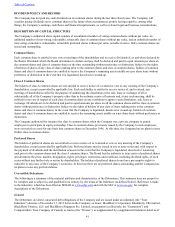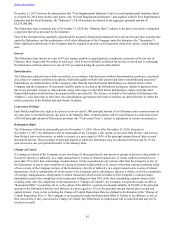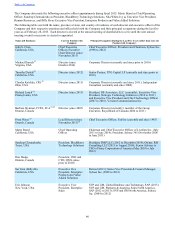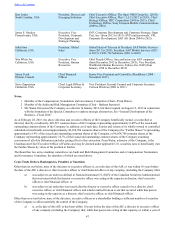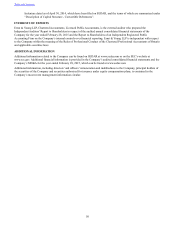Blackberry 2015 Annual Report Download - page 49
Download and view the complete annual report
Please find page 49 of the 2015 Blackberry annual report below. You can navigate through the pages in the report by either clicking on the pages listed below, or by using the keyword search tool below to find specific information within the annual report.
Table of Contents
40
economic uncertainty. Network carriers may further reduce device subsidies that they offer to end users or attempt to extend the
periods of contracts that obligate end users to use a certain device. Any such developments could have a material adverse
impact on the Company’s business, results of operations and financial condition.
In addition, acts of terrorism and the outbreak of hostilities and armed conflicts within or between countries have created and
may continue to create uncertainties that may affect the global economy and could have a material adverse effect on the
Company’s business, results of operations and financial condition.
A significant portion of the Company’s assets are held in cash, cash equivalents, short-term or long-term
investments, all of which are subject to market and credit risk.
The Company had total cash, cash equivalents and investments of $3.3 billion as at February 28, 2015, compared to $2.7 billion
as at March 1, 2014. Cash equivalents, short term and other investments are invested primarily in debt securities of varying
maturities. Consequently, the Company is exposed to interest rate risk and its results of operations may be adversely affected by
changes in interest rates. The fair value of short term and other investments, as well as the investment income derived from the
investment portfolio, will fluctuate with changes in prevailing interest rates.
Additionally, the Company is exposed to credit risk on its investment portfolio. While the Company’s investment policies
include investing in liquid, investment-grade securities and limiting investments in any single issuer, there can be no assurance
that such investment policies will reduce or eliminate market or credit risks. See “Market Risk of Financial Instruments” in the
Company's MD&A for the fiscal year ended February 28, 2015 for a discussion of credit risk related to the Company's
investment portfolio.
Future issuances of common shares by the Company, including upon any conversion of the Debentures, will be
dilutive to existing shareholders.
The Company is authorized to issue an unlimited number of voting common shares, an unlimited number of non-voting Class A
common shares and an unlimited number of preferred shares issuable in series on terms and conditions established by the
Board, generally without the approval of shareholders. Existing shareholders have no pre-emptive rights in connection with
such further issues. During fiscal 2014, the Company issued $1.25 billion aggregate principal amount of Debentures, which
may be converted at the holders’ option for up to 125,000,000 common shares (subject to adjustment in certain circumstances).
If the Debentures were converted in full as at February 28, 2015, the common shares issued would represent approximately
19.1% of the Company’s then outstanding common shares. Subject to TSX and NASDAQ rules requiring shareholder
approval, the Company may make future acquisitions or enter into financings or other transactions involving the issuance of
common shares or securities convertible into common shares, which may be dilutive to existing shareholders. Sales or
issuances of substantial numbers of common shares, or the perception that such sales could occur, may adversely affect
prevailing market pricing for the Company's common shares.
The Company’s charter documents enable its directors to issue preferred shares which may prevent a takeover by a
third party.
The Board also has the authority to issue an unlimited number of preferred shares and determine the price, designation, rights,
preferences, privileges, restrictions and conditions, including dividend rights, of these shares without any further vote or action
by shareholders. The rights of the holders of common shares will be subject to, and may be adversely affected by, the rights of
holders of any preferred shares that may be issued in the future. Subject to the Company's compliance with applicable securities
law requirements, the Company’s ability to issue preferred shares could make it more difficult for a third party to acquire a
majority of the Company’s outstanding voting shares, the effect of which may be to deprive the Company’s shareholders of a
control premium that might otherwise be realized in connection with an acquisition of the Company.
There could be adverse tax consequence for the Company’s shareholders in the United States if the Company is or
was a passive foreign investment company.
Under U.S. federal income tax laws, if a company is, or for any past period was, a passive foreign investment company
(“PFIC”), there could be adverse U.S. federal income tax consequences to U.S. shareholders even if the Company is no longer a
PFIC. The determination of whether the Company is a PFIC is a factual determination made annually based on various facts
and circumstances and thus is subject to change, and the principles and methodology used in determining whether a company is
a PFIC are subject to interpretation. While the Company does not believe that it is currently or has been a PFIC, there can be no
assurance that the Company was not a PFIC in the past and will not be a PFIC in the future. U.S. shareholders are urged to
consult their tax advisors concerning U.S. federal income tax consequences of holding the Company’s common shares if the
Company is or has been considered a PFIC.


